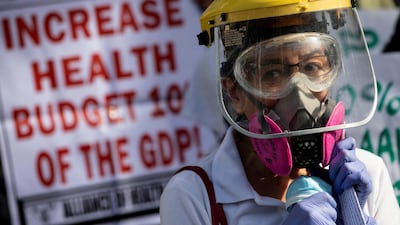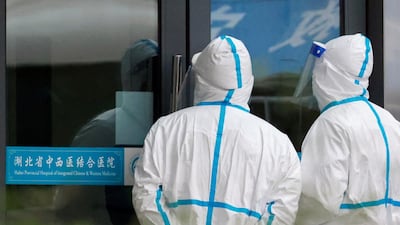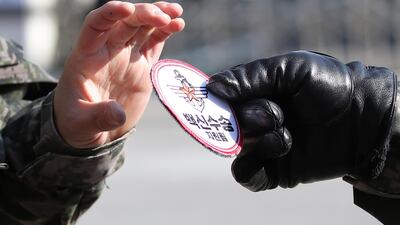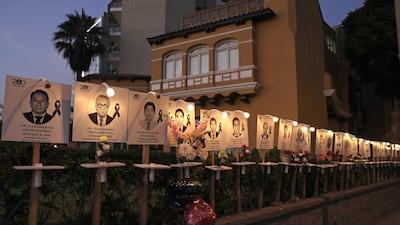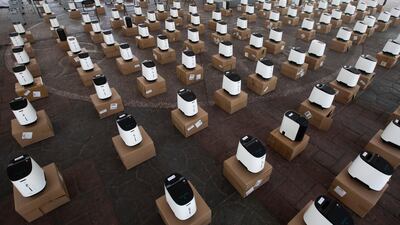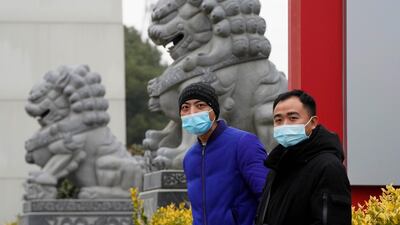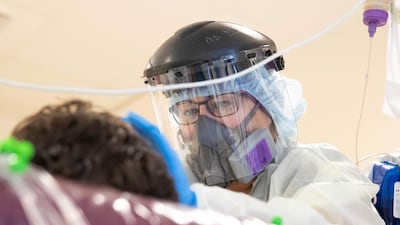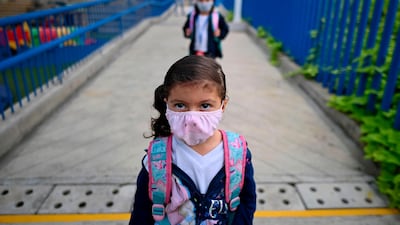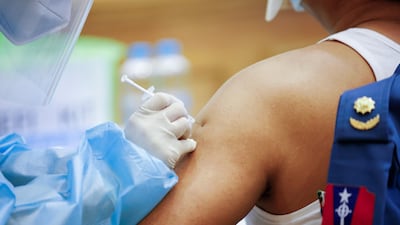As the world battles the Covid-19 pandemic, resources are being sucked away from the fight against a host of debilitating diseases that affect 1.7 billion of the poorest people on the planet, medical experts have warned.
On Saturday, charities marked World Neglected Tropical Diseases Day, seeking to draw attention to a diverse group of communicable diseases that still cause immense suffering around the world, even though they can be prevented or cured.
They include: leprosy, Chagas disease, intestinal worms, dengue and chikungunya, Guinea worm disease, scabies, trachoma and schistosomiasis, lymphatic filariasis – which can develop into elephantiasis, yaws, river blindness and sleeping sickness.
Yet despite calls to eradicate such diseases by the likes of former US president Jimmy Carter and the late British physicist Stephen Hawking, they are still widespread.
Coronavirus around the world - in pictures
Here are 10 key facts about Neglected Tropical Diseases, known as NTDs:
1. Affecting over 1.7 billion globally, NTDs are responsible for thousands of preventable deaths each year. The number of people affected has fallen from two billion in 2010.
These diseases blind, disable and disfigure and perpetuate a cycle of poverty, keeping millions of children out of school and adults from work.
2. The number of NTDs was increased to 20 from 17 in 2016, with three new diseases added: mycetoma, chromoblastomycosis and other deep mycoses, scabies and other ectoparasites and snakebite envenoming.
3. NTDs are primarily found in poor populations living in tropical and subtropical climates across Africa, Asia and South America.
4. The diseases afflict those without access to clean water, sanitation and the basic health services required to protect themselves against infection by bacteria, viruses and other pathogens. These include communities in remote, rural areas, urban slums or conflict zones.
5. Scientists have voiced concerns that global warming could increase the number of people exposed to mosquito-carrying viruses – including dengue fever and Zika virus – by one billion by 2080, if the climate continues to warm at current rates.
6. High-income groups are rarely affected. More than 70 per cent of countries and territories that report the presence of NTDs are low-income or lower middle-income economies, according to the World Health Organisation.
7. Many NTDs are chronic, slowly developing conditions that become progressively worse if undetected and untreated – and the damage they cause can be irreversible.
For example, trachoma – a bacterial eye infection – damages the eyelids, causing the eyelashes to turn inwards and rub painfully against the eyeball. If not corrected with surgery, it can lead to irreversible vision loss and blindness.
8. NTDs can cause severe pain and life-long disabilities, with long-term consequences for the patient and their family.
People with NTDs are often stigmatised and excluded from society, such as people with leprosy. In some countries, leper colonies continue to exist. People in such communities are ostracised from society, often with adverse impact on their mental health.
9. In 2012, the WHO and member states agreed on the first global road map aimed at eliminating or eradicating 17 NTDs.
So far, 42 countries have eliminated at least one NTD.
The WHO released its second 10-year plan on January 28 with the aim of eliminating at least one of the 20 recognized NTDs in at least 90 countries by 2030.
It also aims to make drugs safe and available and target the mosquitoes, flies and ticks that spread some NTDs. This is with a view to cutting the number of people requiring medical treatment for the diseases by 90 per cent over the next 10 years.
10. Health experts say efforts to alleviate NTDs are being hampered by the Covid-19 pandemic, which is pushing already strained healthcare systems to breaking point.
The WHO said in September the outbreak had hit NTD programmes, with countries having to suspend mass treatment interventions and active-case finding and delay diagnosis and treatment.
Critical personnel have been reassigned to deal with Covid-19 and the manufacture, shipment and delivery of medicines has been disrupted, it said, warning of "an increased burden of NTDs".
HOW DO SIM CARD SCAMS WORK?
Sim swap frauds are a form of identity theft.
They involve criminals conning mobile phone operators into issuing them with replacement Sim cards, often by claiming their phone has been lost or stolen
They use the victim's personal details - obtained through criminal methods - to convince such companies of their identity.
The criminal can then access any online service that requires security codes to be sent to a user's mobile phone, such as banking services.
Where to Find Me by Alba Arikha
Alma Books
What are the GCSE grade equivalents?
- Grade 9 = above an A*
- Grade 8 = between grades A* and A
- Grade 7 = grade A
- Grade 6 = just above a grade B
- Grade 5 = between grades B and C
- Grade 4 = grade C
- Grade 3 = between grades D and E
- Grade 2 = between grades E and F
- Grade 1 = between grades F and G
Match statistics
Dubai Sports City Eagles 8 Dubai Exiles 85
Eagles
Try: Bailey
Pen: Carey
Exiles
Tries: Botes 3, Sackmann 2, Fourie 2, Penalty, Walsh, Gairn, Crossley, Stubbs
Cons: Gerber 7
Pens: Gerber 3
Man of the match: Tomas Sackmann (Exiles)
Red flags
- Promises of high, fixed or 'guaranteed' returns.
- Unregulated structured products or complex investments often used to bypass traditional safeguards.
- Lack of clear information, vague language, no access to audited financials.
- Overseas companies targeting investors in other jurisdictions - this can make legal recovery difficult.
- Hard-selling tactics - creating urgency, offering 'exclusive' deals.
Courtesy: Carol Glynn, founder of Conscious Finance Coaching
LA LIGA FIXTURES
Friday
Granada v Real Betis (9.30pm)
Valencia v Levante (midnight)
Saturday
Espanyol v Alaves (4pm)
Celta Vigo v Villarreal (7pm)
Leganes v Real Valladolid (9.30pm)
Mallorca v Barcelona (midnight)
Sunday
Atletic Bilbao v Atletico Madrid (4pm)
Real Madrid v Eibar (9.30pm)
Real Sociedad v Osasuna (midnight)
Strait of Hormuz
Fujairah is a crucial hub for fuel storage and is just outside the Strait of Hormuz, a vital shipping route linking Middle East oil producers to markets in Asia, Europe, North America and beyond.
The strait is 33 km wide at its narrowest point, but the shipping lane is just three km wide in either direction. Almost a fifth of oil consumed across the world passes through the strait.
Iran has repeatedly threatened to close the strait, a move that would risk inviting geopolitical and economic turmoil.
Last month, Iran issued a new warning that it would block the strait, if it was prevented from using the waterway following a US decision to end exemptions from sanctions for major Iranian oil importers.
UAE currency: the story behind the money in your pockets
What the law says
Micro-retirement is not a recognised concept or employment status under Federal Decree Law No. 33 of 2021 on the Regulation of Labour Relations (as amended) (UAE Labour Law). As such, it reflects a voluntary work-life balance practice, rather than a recognised legal employment category, according to Dilini Loku, senior associate for law firm Gateley Middle East.
“Some companies may offer formal sabbatical policies or career break programmes; however, beyond such arrangements, there is no automatic right or statutory entitlement to extended breaks,” she explains.
“Any leave taken beyond statutory entitlements, such as annual leave, is typically regarded as unpaid leave in accordance with Article 33 of the UAE Labour Law. While employees may legally take unpaid leave, such requests are subject to the employer’s discretion and require approval.”
If an employee resigns to pursue micro-retirement, the employment contract is terminated, and the employer is under no legal obligation to rehire the employee in the future unless specific contractual agreements are in place (such as return-to-work arrangements), which are generally uncommon, Ms Loku adds.
Results
1.30pm Handicap (PA) Dh50,000 (Dirt) 1,400m
Winner Al Suhooj, Saif Al Balushi (jockey), Khalifa Al Neyadi (trainer)
2pm Handicap (TB) 68,000 (D) 1,950m
Winner Miracle Maker, Xavier Ziani, Salem bin Ghadayer
2.30pm Maiden (TB) Dh60,000 (D) 1,600m
Winner Mazagran, Tadhg O’Shea, Satish Seemar
3pm Handicap (TB) Dh84,000 (D) 1,800m
Winner Tailor’s Row, Royston Ffrench, Salem bin Ghadayer
3.30pm Handicap (TB) Dh76,000 (D) 1,400m
Winner Alla Mahlak, Adrie de Vries, Rashed Bouresly
4pm Maiden (TB) Dh60,000 (D) 1,200m
Winner Hurry Up, Royston Ffrench, Salem bin Ghadayer
4.30pm Handicap (TB) Dh68,000 (D) 1,200m
Recent winners
2002 Giselle Khoury (Colombia)
2004 Nathalie Nasralla (France)
2005 Catherine Abboud (Oceania)
2007 Grace Bijjani (Mexico)
2008 Carina El-Keddissi (Brazil)
2009 Sara Mansour (Brazil)
2010 Daniella Rahme (Australia)
2011 Maria Farah (Canada)
2012 Cynthia Moukarzel (Kuwait)
2013 Layla Yarak (Australia)
2014 Lia Saad (UAE)
2015 Cynthia Farah (Australia)
2016 Yosmely Massaad (Venezuela)
2017 Dima Safi (Ivory Coast)
2018 Rachel Younan (Australia)
Roger Federer's record at Wimbledon
Roger Federer's record at Wimbledon
1999 - 1st round
2000 - 1st round
2001 - Quarter-finalist
2002 - 1st round
2003 - Winner
2004 - Winner
2005 - Winner
2006 - Winner
2007 - Winner
2008 - Finalist
2009 - Winner
2010 - Quarter-finalist
2011 - Quarter-finalist
2012 - Winner
2013 - 2nd round
2014 - Finalist
2015 - Finalist
2016 - Semi-finalist
A list of the animal rescue organisations in the UAE
Friday's schedule in Madrid
Men's quarter-finals
Novak Djokivic (1) v Marin Cilic (9) from 2pm UAE time
Roger Federer (4) v Dominic Thiem (5) from 7pm
Stefanos Tsitsipas (8) v Alexander Zverev (3) from 9.30pm
Stan Wawrinka v Rafael Nadal (2) from 11.30pm
Women's semi-finals
Belinda Bencic v Simona Halep (3) from 4.30pm
Sloane Stephens (8) v Kiki Bertens (7) from 10pm

